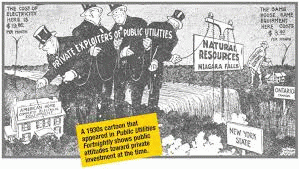Giant bank holding companies now own airports, toll roads, and
ports; control power plants; and store and hoard vast quantities of commodities
of all sorts. They are systematically buying up or gaining control of the
essential lifelines of the economy. How have they pulled this off, and where
have they gotten the money?
In a
letter to Federal Reserve Chairman Ben Bernanke dated June 27, 2013, US
Representative Alan Grayson and three co-signers expressed concern about the
expansion of large banks into what have traditionally been non-financial
commercial spheres. Specifically:
"[W]e are concerned about how large banks have recently
expanded their businesses into such fields as electric power production, oil
refining and distribution, owning and operating of public assets such as ports
and airports, and even uranium mining."
After listing some disturbing examples, they observed:
"According to legal
scholar Saule Omarova , over the past
five years, there has been a "quiet transformation of U.S. financial holding
companies." These financial services companies have become global merchants that seek to
extract rent from any commercial or financial business activity within their
reach. They have used legal authority in
Graham-Leach-Bliley to subvert the "foundational principle of separation of banking from
commerce" . . . .
"It seems like there is a
significant macro-economic risk in having a massive entity like, say JP Morgan,
both issuing credit cards and mortgages, managing municipal bond offerings,
selling gasoline and electric power, running large oil tankers, trading
derivatives, and owning and operating airports, in multiple countries."
A "macro" risk indeed -- not just to our
economy but to our democracy and our individual and national sovereignty. Giant
banks are buying up our country's infrastructure -- the power and supply chains
that are vital to the economy. Aren't there rules against that? And where are the
banks getting the money?
How Banks Launder Money Through the Repo Market
In an illuminating series of articles on
Seeking Alpha titled "Repoed!",
Colin Lokey argues that the investment
arms of large Wall Street banks are using their "excess" deposits -- the excess
of deposits over loans -- as collateral for borrowing in the repo market. Repos,
or "repurchase agreements," are used to raise short-term capital. Securities
are sold to investors overnight and repurchased the next day, usually day after
day.
The deposit-to-loan gap for all US banks
is now about $2 trillion, and nearly half of this gap is in Bank of America, JP
Morgan Chase, and Wells Fargo alone. It seems that the largest banks are using
the majority of their deposits (along with the Federal Reserve's quantitative
easing dollars) not to back loans to individuals and businesses but to borrow
for their own trading. Acquiring a company or a portion of a company mostly with
borrowed money is called a "leveraged buyout." The banks are leveraging our
money to buy up ports, airports, toll roads, power, and massive stores of
commodities.
Using these excess deposits directly for
their own speculative trading would be blatantly illegal, but the banks have
been able to avoid the appearance of impropriety by borrowing from the repo market.
(See my earlier article here.) The banks'
excess deposits are first used to purchase Treasury bonds, agency securities,
and other highly liquid, "safe" securities. These liquid assets are then pledged
as collateral in repo transactions, allowing the banks to get "clean" cash to
invest as they please. They can channel this laundered money into risky assets
such as derivatives, corporate bonds, and equities (stock).
That means they can buy up companies. Lokey
writes, "It is common knowledge that prop [proprietary] trading desks at banks
can and do invest in a variety of assets, including stocks." Prop trading desks
invest for the banks' own accounts. This was something that depository banks
were forbidden to do by the New Deal-era Glass-Steagall Act but that was
allowed in 1999 by the Gramm-Leach-Bliley Act, which repealed those portions of
Glass-Steagall.
The result has been a massively risky
$700-plus trillion speculative derivatives bubble. Lokey quotes from an article
by Bill Frezza in the January 2013 Huffington
Post titled " Too-Big-To-Fail Banks Gamble With Bernanke Bucks ":
"If you think [the cash cushion from excess deposits] makes the banks
less vulnerable to shock, think again. Much of this balance sheet cash has been
hypothecated in the repo market, laundered through the off-the-books shadow
banking system. This allows the proprietary trading desks at these
"banks" to use that cash as collateral to take out loans to gamble
with. In a process called hyper-hypothecation this pledged collateral gets
pyramided, creating a ticking time bomb ready to go kablooey when the next panic
comes around."
That Explains the Mountain of Excess Reserves
(Note: You can view every article as one long page if you sign up as an Advocate Member, or higher).






